Movie | Buried Treasure | Director | Best Performance in a Leading Role |
Best Performance in a Supporting Role |Best Breakout Performance |
Original Screenplay | Adapted Screenplay | Music in a Film | Sound Design |
Editing | Cinematography | Production Design | Ensemble Cast | Documentary
Best Movie |
|
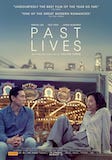  Past Lives – Two childhood sweethearts reunite in New York City decades after they last saw each other in Seoul to contemplate the passage of time and young love. At first glance, the debut feature from Celine Song is a “What if you got another chance with the one who got away?” film but upon closer inspection it’s much more than that. PAST LIVES is the type of film that makes you think deeply not only about what you just saw but about your life choices and all the people you’ve met along the way to where you are now. PAST LIVES is a lovely romance that will fill you with every human emotion possible in its tight 106 minute run time. –gmq Past Lives – Two childhood sweethearts reunite in New York City decades after they last saw each other in Seoul to contemplate the passage of time and young love. At first glance, the debut feature from Celine Song is a “What if you got another chance with the one who got away?” film but upon closer inspection it’s much more than that. PAST LIVES is the type of film that makes you think deeply not only about what you just saw but about your life choices and all the people you’ve met along the way to where you are now. PAST LIVES is a lovely romance that will fill you with every human emotion possible in its tight 106 minute run time. –gmq |
|
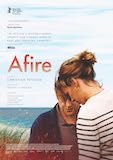 Afire – Leon and Felix, friends from Berlin, have come for a getaway to a family cabin on the Baltic sea. The two young creatives are working (or procrastinating, in Leon’s case) on their projects. Inconveniently, free spirit Nadja is already inhabiting the cabin and enjoying loud sex with the local lifeguard. Friendships develop among them and even Leon’s visiting editor, but Leon rebuffs all invitations to pleasure. And despite assurances that the area is safe, ashes begin to encroach from nearby forest fires. Above all a character portrait of a self-doubting and self-isolating artist, Petzold’s comedy turns slow burn turns gut punch. –djy Afire – Leon and Felix, friends from Berlin, have come for a getaway to a family cabin on the Baltic sea. The two young creatives are working (or procrastinating, in Leon’s case) on their projects. Inconveniently, free spirit Nadja is already inhabiting the cabin and enjoying loud sex with the local lifeguard. Friendships develop among them and even Leon’s visiting editor, but Leon rebuffs all invitations to pleasure. And despite assurances that the area is safe, ashes begin to encroach from nearby forest fires. Above all a character portrait of a self-doubting and self-isolating artist, Petzold’s comedy turns slow burn turns gut punch. –djy |
|
 The Kings of the World – Five boys flee life on the streets of Medellin to pursue their own promise of El Dorado. THE KINGS OF THE WORLD inspires adjectives – visionary, mystical, mysterious, hallucinatory, spiritual, allegorical, philosophical – set in a material world that is earthy, violent, confrontational, by turns merciful and merciless, and extravagantly beautiful. Exemplars of the excellence on display: A long, static shot down an isolated lane illuminated by streetlights as the boys methodically shatter them with thrown rocks, erasing themselves in darkness. A breathtaking, hellbent descent of a twisting mountain road on bicycles, at times artfully dodging a truck, other times tethered to it by the merest of ropes. Exhilarating and heartbreaking. –jp The Kings of the World – Five boys flee life on the streets of Medellin to pursue their own promise of El Dorado. THE KINGS OF THE WORLD inspires adjectives – visionary, mystical, mysterious, hallucinatory, spiritual, allegorical, philosophical – set in a material world that is earthy, violent, confrontational, by turns merciful and merciless, and extravagantly beautiful. Exemplars of the excellence on display: A long, static shot down an isolated lane illuminated by streetlights as the boys methodically shatter them with thrown rocks, erasing themselves in darkness. A breathtaking, hellbent descent of a twisting mountain road on bicycles, at times artfully dodging a truck, other times tethered to it by the merest of ropes. Exhilarating and heartbreaking. –jp |
|
 Monster – The first third of Hirokazu Kore-eda’s first effort set in his native Japan since SHOPLIFTERS comes off as a darkly comic fable about a fifth-grader ostensibly being bullied by his teacher; what happens next sets the momentum for a narrative only fully revealed once all of its pieces eventually fall into place. One of the director’s most accessible works due in part to its swift pace, its unique structure enhances its rhythms while also clinching one’s attention with humor and an innovative premise. Before long, it extends an invitation for viewers to learn the full story and also witness how we can instill change in one another. –ck Monster – The first third of Hirokazu Kore-eda’s first effort set in his native Japan since SHOPLIFTERS comes off as a darkly comic fable about a fifth-grader ostensibly being bullied by his teacher; what happens next sets the momentum for a narrative only fully revealed once all of its pieces eventually fall into place. One of the director’s most accessible works due in part to its swift pace, its unique structure enhances its rhythms while also clinching one’s attention with humor and an innovative premise. Before long, it extends an invitation for viewers to learn the full story and also witness how we can instill change in one another. –ck |
|
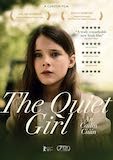 The Quiet Girl – Sent away from a family that literally lacks money or time to spend on her, a young girl finds herself enfolded, finally, by love, care, and acceptance in the house of her mother’s older cousin. Set against the rigors and rituals of an Irish dairy farm, the story unfolds with gentleness and grace, providing the peace a quiet girl needs to find herself. THE QUIET GIRL proves that wholesome need not be saccharine and centers beauty, serenity, and compassion in pastoral life and community. –jp The Quiet Girl – Sent away from a family that literally lacks money or time to spend on her, a young girl finds herself enfolded, finally, by love, care, and acceptance in the house of her mother’s older cousin. Set against the rigors and rituals of an Irish dairy farm, the story unfolds with gentleness and grace, providing the peace a quiet girl needs to find herself. THE QUIET GIRL proves that wholesome need not be saccharine and centers beauty, serenity, and compassion in pastoral life and community. –jp |
|
 R.M.N. – Consumed by conflict – ethnic, religious, racial, economic, generational, marital, predatory – R.M.N. fairly bristles with suppressed rage. When, finally, it’s released, it threatens, existentially, an isolated, Romanian village where the local open pit mine has closed, local businesses pay a pittance, and local workers go abroad to earn more money so that the local businesses must employ foreigners which the conservative locals fear will disrupt their culture. It is a grim and angry movie. The bears are out for blood. –jp R.M.N. – Consumed by conflict – ethnic, religious, racial, economic, generational, marital, predatory – R.M.N. fairly bristles with suppressed rage. When, finally, it’s released, it threatens, existentially, an isolated, Romanian village where the local open pit mine has closed, local businesses pay a pittance, and local workers go abroad to earn more money so that the local businesses must employ foreigners which the conservative locals fear will disrupt their culture. It is a grim and angry movie. The bears are out for blood. –jp |
|
Buried Treasure |
|
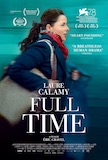  Full Time is a pressure cooker of a film, about a woman trying to navigate everyday life, while her circumstances make that increasingly more difficult. Julie lives with her two children in a village far outside of Paris. She has a high pressure job as head chamber maid at a five-star hotel and must leave her children (before sunrise) with an elderly neighbor while she goes to work. Complicating this is a transportation strike in Paris. Julie keeps getting home later and later and the neighbor has had enough. In addition, Julie is barely able to make ends meet and her husband is late with alimony and not responding to her calls. While Julie is capable of much more than her chamber maid position, finding the time to interview for the better position seems impossible. FULL TIME is constructed like a driving thriller, with close-ups and fluidity (thanks to a handheld camera work), quick cuts and use of sound that increase the tension to an almost unbearable level. Julie only exists in the moment, as to do otherwise would surely cause her to explode. If she stops to second guess or panic, to feel much of anything, everything would fall apart. We wonder if she’ll ever be able to release all the pressure. Laura Calamy gives a striking performance as Julie. In addition the cinematography, sound, set and production design were on point and extremely well done. — jb Full Time is a pressure cooker of a film, about a woman trying to navigate everyday life, while her circumstances make that increasingly more difficult. Julie lives with her two children in a village far outside of Paris. She has a high pressure job as head chamber maid at a five-star hotel and must leave her children (before sunrise) with an elderly neighbor while she goes to work. Complicating this is a transportation strike in Paris. Julie keeps getting home later and later and the neighbor has had enough. In addition, Julie is barely able to make ends meet and her husband is late with alimony and not responding to her calls. While Julie is capable of much more than her chamber maid position, finding the time to interview for the better position seems impossible. FULL TIME is constructed like a driving thriller, with close-ups and fluidity (thanks to a handheld camera work), quick cuts and use of sound that increase the tension to an almost unbearable level. Julie only exists in the moment, as to do otherwise would surely cause her to explode. If she stops to second guess or panic, to feel much of anything, everything would fall apart. We wonder if she’ll ever be able to release all the pressure. Laura Calamy gives a striking performance as Julie. In addition the cinematography, sound, set and production design were on point and extremely well done. — jb |
|
 The Artifice Girl – While the use of artificial intelligence grows and integrates further into our society to provide quicker solutions, there are no easy answers in THE ARTIFICE GIRL. Films on the topic often focus on AI as the centerpiece of paranoia, but the ethical considerations that set this film apart revolve around humans as the “parents” ultimately responsible for this human-adjacent tool. Franklin Ritch’s precise direction and compelling script guide us through a tense set of moral dilemmas, anchored by stellar performances from the talented cast. As we grapple with the ethical complexities of AI’s role in our lives, THE ARTIFICE GIRL is truly a standout, deserving recognition and acclaim at this year’s awards ceremony. –br The Artifice Girl – While the use of artificial intelligence grows and integrates further into our society to provide quicker solutions, there are no easy answers in THE ARTIFICE GIRL. Films on the topic often focus on AI as the centerpiece of paranoia, but the ethical considerations that set this film apart revolve around humans as the “parents” ultimately responsible for this human-adjacent tool. Franklin Ritch’s precise direction and compelling script guide us through a tense set of moral dilemmas, anchored by stellar performances from the talented cast. As we grapple with the ethical complexities of AI’s role in our lives, THE ARTIFICE GIRL is truly a standout, deserving recognition and acclaim at this year’s awards ceremony. –br |
|
 The Cow Who Sang a Song Into the Future –When all the fish in the river by a dairy farm in rural Chile die, many blame the nearby factory, but when that event heralds the return of a woman who allegedly committed suicide over 40 years earlier by driving her motorcycle into that same river, it appears that something more spiritual or mystical in nature may be at play. What unfolds is an ecological fable crossed with a feminist protest by both humans and beasts as cows sing the tragic song of their future, bees disappear, and a family is reunited despite the veil of the afterlife keeping them apart. Francisca Alegria’s debut feature is filled with haunting imagery, strong performances, and powerful ideas, so powerful that even if you don’t understand exactly what she is trying to say, the film will stick with you for days. –mrc The Cow Who Sang a Song Into the Future –When all the fish in the river by a dairy farm in rural Chile die, many blame the nearby factory, but when that event heralds the return of a woman who allegedly committed suicide over 40 years earlier by driving her motorcycle into that same river, it appears that something more spiritual or mystical in nature may be at play. What unfolds is an ecological fable crossed with a feminist protest by both humans and beasts as cows sing the tragic song of their future, bees disappear, and a family is reunited despite the veil of the afterlife keeping them apart. Francisca Alegria’s debut feature is filled with haunting imagery, strong performances, and powerful ideas, so powerful that even if you don’t understand exactly what she is trying to say, the film will stick with you for days. –mrc
|
|
 Give Me Pity! — Cheerfully billed as “A Saturday Night Television Special” starring Sissy St. Claire (Sophie von Haselberg), writer/director Amanda Kramer’s weirdo art piece may feel as if it’s beaming in from another planet to those unfamiliar with 1970s/80s variety shows. But she understands that if you’re going to make a feature-length pastiche, pinpoint accuracy is required (smeary video in the classic 4:3 standard definition format, neon colors, the requisite hanging mirrorball, vintage-looking graphics, etc.) It also gradually transcends its premise, revealing layer after layer of everything that goes into a performance and the toll it can take on the performer’s psyche. –ck Give Me Pity! — Cheerfully billed as “A Saturday Night Television Special” starring Sissy St. Claire (Sophie von Haselberg), writer/director Amanda Kramer’s weirdo art piece may feel as if it’s beaming in from another planet to those unfamiliar with 1970s/80s variety shows. But she understands that if you’re going to make a feature-length pastiche, pinpoint accuracy is required (smeary video in the classic 4:3 standard definition format, neon colors, the requisite hanging mirrorball, vintage-looking graphics, etc.) It also gradually transcends its premise, revealing layer after layer of everything that goes into a performance and the toll it can take on the performer’s psyche. –ck |
|
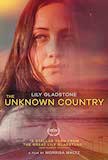 The Unknown Country – The common element of most road movies if their episodic nature. When traveling from one location to another, the protagonist(s) will, over time, encounter various characters that either provide charming or unexpected encounters, or propel the forward on their trip. Usually the viewer only learns enough about these characters as to make them interesting during their encounters with the main character, but in her debut feature, director Morissa Maltz takes us a step further into these characters, offering brief vignettes, offering a capsule synopsis of their lives, information that our lead character never learns and doesn’t need to. The twist is these brief offshoots that occur periodically through the film are mini-documentaries of real people. They add flavor and a sense of realism to an already beautifully written story of grief, as Tana, a young woman who recently lost her grandmother floats through the weeks after her death traveling to visit family, then ultimately from the north to the south in search of meaning. Fortunately for Maltz, and us, Tana is played by Lily Gladstone, whose expressive face, haunted eyes, and grounded performance elevate THE UNKNOWN COUNTRY to a very special place, and prove she is lead material. –mrc The Unknown Country – The common element of most road movies if their episodic nature. When traveling from one location to another, the protagonist(s) will, over time, encounter various characters that either provide charming or unexpected encounters, or propel the forward on their trip. Usually the viewer only learns enough about these characters as to make them interesting during their encounters with the main character, but in her debut feature, director Morissa Maltz takes us a step further into these characters, offering brief vignettes, offering a capsule synopsis of their lives, information that our lead character never learns and doesn’t need to. The twist is these brief offshoots that occur periodically through the film are mini-documentaries of real people. They add flavor and a sense of realism to an already beautifully written story of grief, as Tana, a young woman who recently lost her grandmother floats through the weeks after her death traveling to visit family, then ultimately from the north to the south in search of meaning. Fortunately for Maltz, and us, Tana is played by Lily Gladstone, whose expressive face, haunted eyes, and grounded performance elevate THE UNKNOWN COUNTRY to a very special place, and prove she is lead material. –mrc |
|
 Utama – Writer/director Alejandro Loayza Grisi has constructed a gorgeous film that is part generational divide, part environmental cautionary tale, part old ways vs. new ways, and part love song between an elderly couple in the highlands of Brazil. Virginio and Sisa are part of the Quechua indigenous people who live in a tiny village grazing the llamas and growing their own food. When the rains don’t arrive at their usual time, things begin to get dire, and more and more people are leaving the highlands to go to the city. Clever, the couple’s grandson, arrives to bring them good news and convince them to join their family in the City, but Virginio stubbornly refuses, and a secret he is keeping from his family has dire consequences. In the end, is it the onslaught of global warming, or the quality of sacrifice to the weather gods that controls their fate? Cinematographer Barbara Alvarez, also nominated uses the landscape, the couple’s weathered faces, and the llamas to great effect. –mrc Utama – Writer/director Alejandro Loayza Grisi has constructed a gorgeous film that is part generational divide, part environmental cautionary tale, part old ways vs. new ways, and part love song between an elderly couple in the highlands of Brazil. Virginio and Sisa are part of the Quechua indigenous people who live in a tiny village grazing the llamas and growing their own food. When the rains don’t arrive at their usual time, things begin to get dire, and more and more people are leaving the highlands to go to the city. Clever, the couple’s grandson, arrives to bring them good news and convince them to join their family in the City, but Virginio stubbornly refuses, and a secret he is keeping from his family has dire consequences. In the end, is it the onslaught of global warming, or the quality of sacrifice to the weather gods that controls their fate? Cinematographer Barbara Alvarez, also nominated uses the landscape, the couple’s weathered faces, and the llamas to great effect. –mrc |
|
Best Director |
|
  Hirokazu Koreeda for Monster – Internationally renown director Hirokazu Koreeda picks up his 8th Chlotrudis nomination in this category (including two wins) with his Rashomon-style telling of an emotional tale about two young boys involved in a complex school issue. With the story slowly being revealed through three different points-of-view, it’s not until the final third that things become clear. Koreeda handles the slow unfolding of the story beautiful, while applying his gentle, humanist point-of-view to a tough story. Like many of this films, the balance between the warm, supportive dynamics, and the harsh realities of everyday life come into conflict with ramifications that are open to interpretation as the final scene fades. This is the first time Koreeda is working from a screenplay he did not write, but his style is all over this film, proving his style and expertise is indelible. — mrc Hirokazu Koreeda for Monster – Internationally renown director Hirokazu Koreeda picks up his 8th Chlotrudis nomination in this category (including two wins) with his Rashomon-style telling of an emotional tale about two young boys involved in a complex school issue. With the story slowly being revealed through three different points-of-view, it’s not until the final third that things become clear. Koreeda handles the slow unfolding of the story beautiful, while applying his gentle, humanist point-of-view to a tough story. Like many of this films, the balance between the warm, supportive dynamics, and the harsh realities of everyday life come into conflict with ramifications that are open to interpretation as the final scene fades. This is the first time Koreeda is working from a screenplay he did not write, but his style is all over this film, proving his style and expertise is indelible. — mrc |
|
 Colm Bairéad for The Quiet Girl – Colm Bairéad’s directorial debut THE QUIET GIRL is a heartwarming tale about a young girl finding love and embrace from distant relatives in rural 1980s Ireland. Bairéad’s lens transports the viewer back to their childhood as they’re shown nearly everything from the young girl’s point of view but without being too sappy or cliché about it. Where Bairéad’s shines is he drops subtle and not so subtle hints to you, the adult viewer, that would most likely be completely overlooked by a child. A piece of jewelry here, children’s clothes there, a glance in a car here, a look from the kitchen table there. Bairéad applies a sensitive touch as a storyteller making THE QUIET GIRL a moving look at what two loving people can provide a child in need and the importance of simply being there as parents. –gmq Colm Bairéad for The Quiet Girl – Colm Bairéad’s directorial debut THE QUIET GIRL is a heartwarming tale about a young girl finding love and embrace from distant relatives in rural 1980s Ireland. Bairéad’s lens transports the viewer back to their childhood as they’re shown nearly everything from the young girl’s point of view but without being too sappy or cliché about it. Where Bairéad’s shines is he drops subtle and not so subtle hints to you, the adult viewer, that would most likely be completely overlooked by a child. A piece of jewelry here, children’s clothes there, a glance in a car here, a look from the kitchen table there. Bairéad applies a sensitive touch as a storyteller making THE QUIET GIRL a moving look at what two loving people can provide a child in need and the importance of simply being there as parents. –gmq |
|
 Hong Sang-soo for The Novelist’s Film – South Korean director, Hong Sang-Soo, is a prolific filmmaker, having directed 31 feature narratives in the past 29 years, and 8 alone in the last 4 years. One of three films he directd in 2017, THE DAY AFTER, was nominated for a Buried Treasure, which is when we first discovered his unique, compelling filmmaking style. In THE NOVELIST’S FILM, Hong masters the craft of focusing on a fascinating, but somewhat off-putting protagonist, as she visits the town she is from after she left to write a best-selling novel. The episodic nature of this film has the character revisiting various haunts and bumping into, or meeting various characters with whom she interacts. Shrewd writing, terrific character moments, and a pointed visual style all come together to create a lovely, revelatory work that showcases Hong’s skill as a director. — mrc Hong Sang-soo for The Novelist’s Film – South Korean director, Hong Sang-Soo, is a prolific filmmaker, having directed 31 feature narratives in the past 29 years, and 8 alone in the last 4 years. One of three films he directd in 2017, THE DAY AFTER, was nominated for a Buried Treasure, which is when we first discovered his unique, compelling filmmaking style. In THE NOVELIST’S FILM, Hong masters the craft of focusing on a fascinating, but somewhat off-putting protagonist, as she visits the town she is from after she left to write a best-selling novel. The episodic nature of this film has the character revisiting various haunts and bumping into, or meeting various characters with whom she interacts. Shrewd writing, terrific character moments, and a pointed visual style all come together to create a lovely, revelatory work that showcases Hong’s skill as a director. — mrc |
|
 Aki Kaurismäki for Fallen Leaves – As wildly unlikely as anyone would ever expect, Aki Kaurismäki, in his latest feature, FALLEN LEAVES, delivers a romantic comedy. He hits all the genre’s tropes – the wing man, the meet cute, the verbal jousting, the inevitable trials and tribulations – but makes it unmistakably his own. Every Kaurismäki trope is here, as well, the deadpan delivery, the almost claustrophobic closeups, lots of conversation, and, without hitting us over the head (well, maybe a little bit), his cogent observations on the precarious lives of the working classes. What makes his direction, in the end, revelatory, where he stretches himself a bit, is in how he adapts his own dystopian style to comedy, letting a ray of sunshine into his usually dour outlook. The dialog between his two leads is hilarious (echoing another auteur’s similarly unlikely rom-com venture, Paul Thomas Anderson’s PUNCH-DRUNK LOVE), and it’s a mark of Kaurismäki’s genius that he pulls it off without skipping a beat. –jp Aki Kaurismäki for Fallen Leaves – As wildly unlikely as anyone would ever expect, Aki Kaurismäki, in his latest feature, FALLEN LEAVES, delivers a romantic comedy. He hits all the genre’s tropes – the wing man, the meet cute, the verbal jousting, the inevitable trials and tribulations – but makes it unmistakably his own. Every Kaurismäki trope is here, as well, the deadpan delivery, the almost claustrophobic closeups, lots of conversation, and, without hitting us over the head (well, maybe a little bit), his cogent observations on the precarious lives of the working classes. What makes his direction, in the end, revelatory, where he stretches himself a bit, is in how he adapts his own dystopian style to comedy, letting a ray of sunshine into his usually dour outlook. The dialog between his two leads is hilarious (echoing another auteur’s similarly unlikely rom-com venture, Paul Thomas Anderson’s PUNCH-DRUNK LOVE), and it’s a mark of Kaurismäki’s genius that he pulls it off without skipping a beat. –jp |
|
 Laura Mora Ortega for The Kings of the World Laura Mora Ortega for The Kings of the World |
|
 Celine Song for Past Lives – Celine Song’s directorial debut rightfully catapults her to the international stage. Offering a raw and empathetic perspective on romantic destiny, Song’s direction skilfully sidesteps melodramatic tropes, opting for the grounded and sincere. Her careful treatment of Arthur, our otherwise-antagonist to the conventional romantic pairing, elevates the story beyond its narrative arc. While the film features a deluge of beautifully composed shots, it’s Song’s restraint that really lets the actors shine, inviting viewers to contemplate the characters’ uncertainties in silence. Her visionary direction infuses each frame with emotional depth and authenticity, immersing viewers in a richly layered story that lingers in the mind long after the credits roll. We can’t wait to see what comes next. –cf Celine Song for Past Lives – Celine Song’s directorial debut rightfully catapults her to the international stage. Offering a raw and empathetic perspective on romantic destiny, Song’s direction skilfully sidesteps melodramatic tropes, opting for the grounded and sincere. Her careful treatment of Arthur, our otherwise-antagonist to the conventional romantic pairing, elevates the story beyond its narrative arc. While the film features a deluge of beautifully composed shots, it’s Song’s restraint that really lets the actors shine, inviting viewers to contemplate the characters’ uncertainties in silence. Her visionary direction infuses each frame with emotional depth and authenticity, immersing viewers in a richly layered story that lingers in the mind long after the credits roll. We can’t wait to see what comes next. –cf |
|
Best Performance in a Lead Role
|
|
  Lily Gladstone for the role of Tana in The Unknown Country – Much has been made of Lily Gladstone’s performance as an oppressed Osage woman in THE KILLERS OF THE FLOWER MOON but her performance here in Morrisa Maltz’s impressive debut may be the more arresting of the two. Sure she’s been Oscar recognized and held her own against past Oscar winners Leonardo DiCaprio and Robert DeNiro, but more so here, where she shares the story credit with two other Indigenous women, the inner turmoil and emotion she projects with her eyes and small facial movements is even more wholly beguiling and compelling. As a young woman on an enigmatic trek from her native Oglala Lakota nation lands in the Dakotas to Texas, Gladstone’s Tana doesn’t talk much as she makes her way from place to place interacting with various people but always remains wary and aloof unless around other Native American people and such situations you can see the let down in Tana. It’s subtle, biting social commentary denoted by a performance that’s mostly projection done to near perfection. –tm Lily Gladstone for the role of Tana in The Unknown Country – Much has been made of Lily Gladstone’s performance as an oppressed Osage woman in THE KILLERS OF THE FLOWER MOON but her performance here in Morrisa Maltz’s impressive debut may be the more arresting of the two. Sure she’s been Oscar recognized and held her own against past Oscar winners Leonardo DiCaprio and Robert DeNiro, but more so here, where she shares the story credit with two other Indigenous women, the inner turmoil and emotion she projects with her eyes and small facial movements is even more wholly beguiling and compelling. As a young woman on an enigmatic trek from her native Oglala Lakota nation lands in the Dakotas to Texas, Gladstone’s Tana doesn’t talk much as she makes her way from place to place interacting with various people but always remains wary and aloof unless around other Native American people and such situations you can see the let down in Tana. It’s subtle, biting social commentary denoted by a performance that’s mostly projection done to near perfection. –tm |
|
 Greta Lee for the role of Nora in Past Lives – Greta Lee is an actor so grounded in contemporary realism, she is not necessarily the first choice you might think of for this leading role in a story about love and nostalgia.Known for her voice work, and supporting roles as sidekicks in comedies, she adds a lovely nuanced, mature weight to Celine Song’s beautifully written and directed film. Despite her unique look and recognizable voice, it took me a while to connect the actor to her other recent big role as the offbeat, sarcastic television producer in The Morning Show. Her Nora gives Lee a role to showcase her acting range, and given the films critical and popular reception, shows that a grown-up story about love, and looking back on the past can be sensible and realistic, and still be absorbing. Aided by strong performances by fellow-nominee John Magaro, and co-star Two Yoo, as well as a masterful screenplay, Lee lifts PAST LIVES to another level of greatness. –mrc Greta Lee for the role of Nora in Past Lives – Greta Lee is an actor so grounded in contemporary realism, she is not necessarily the first choice you might think of for this leading role in a story about love and nostalgia.Known for her voice work, and supporting roles as sidekicks in comedies, she adds a lovely nuanced, mature weight to Celine Song’s beautifully written and directed film. Despite her unique look and recognizable voice, it took me a while to connect the actor to her other recent big role as the offbeat, sarcastic television producer in The Morning Show. Her Nora gives Lee a role to showcase her acting range, and given the films critical and popular reception, shows that a grown-up story about love, and looking back on the past can be sensible and realistic, and still be absorbing. Aided by strong performances by fellow-nominee John Magaro, and co-star Two Yoo, as well as a masterful screenplay, Lee lifts PAST LIVES to another level of greatness. –mrc |
|
 Alma Pöysti for the role of Ansa Grönholm in Fallen Leaves – When we first meet Ansa (Alma Pöysti), the heroine in veteran Finnish auteur Aki Kaurismaki’s latest deadpan reverie, she’s working in a drab supermarket. However, she’s no pushover, her pragmatism and point of view inherent in everything from confronting the petty insolvencies of her job to a burgeoning relationship with alcoholic laborer Holappa (Jussi Vatanen). As usual with this director, what would usually come off as affectations are in his hands fully realized and seamlessly essential to the entire fabric—that also extends to Pöysti, perhaps one of the more realistic and thus winning romantic leads to recently appear onscreen. –ck Alma Pöysti for the role of Ansa Grönholm in Fallen Leaves – When we first meet Ansa (Alma Pöysti), the heroine in veteran Finnish auteur Aki Kaurismaki’s latest deadpan reverie, she’s working in a drab supermarket. However, she’s no pushover, her pragmatism and point of view inherent in everything from confronting the petty insolvencies of her job to a burgeoning relationship with alcoholic laborer Holappa (Jussi Vatanen). As usual with this director, what would usually come off as affectations are in his hands fully realized and seamlessly essential to the entire fabric—that also extends to Pöysti, perhaps one of the more realistic and thus winning romantic leads to recently appear onscreen. –ck |
|
 Catalina Saavedra for the role of Señora Vero in Rotting in the Sun – At a Q&A at the Provincetown International Film Festival following ROTTING IN THE SUN, director Sebastián Silva conveyed his lead actress’ response when he approached her about taking the role. “You want me to play another fucking maid?” Fortunately, Caatalina Saavedra, who scored a Chlotrudis Best Actress nomination in 2010 for her powerhouse performance in Silva’s film, THE MAID, agreed to star in his latest work. An in-your-face, outrageous commentary on among-other-things, the class structure in Mexico City, Saavedra plays Vero, director Silva’s housekeeper, who puts her nose into things that don’t concern her, and kicks of an event that sends the film in a both hilarious, and darkly serious direction. She carefully balances between a shrewd woman trying to stay afloat, and someone so far in over her heard that she’s about to go under for the third time. She both grounds and escalates the outrageousness in Silva’s audacious satire. –mrc Catalina Saavedra for the role of Señora Vero in Rotting in the Sun – At a Q&A at the Provincetown International Film Festival following ROTTING IN THE SUN, director Sebastián Silva conveyed his lead actress’ response when he approached her about taking the role. “You want me to play another fucking maid?” Fortunately, Caatalina Saavedra, who scored a Chlotrudis Best Actress nomination in 2010 for her powerhouse performance in Silva’s film, THE MAID, agreed to star in his latest work. An in-your-face, outrageous commentary on among-other-things, the class structure in Mexico City, Saavedra plays Vero, director Silva’s housekeeper, who puts her nose into things that don’t concern her, and kicks of an event that sends the film in a both hilarious, and darkly serious direction. She carefully balances between a shrewd woman trying to stay afloat, and someone so far in over her heard that she’s about to go under for the third time. She both grounds and escalates the outrageousness in Silva’s audacious satire. –mrc |
|
 Joanna Scanlan for the role of Mary in After Love – Scanlan puts forth a quiet yet powerful performance in a story that explores grief, jealousy and ultimately compassion. This is one of the best expositions of middle-aged woman-hood seen in a long time, and Scanlan delivers. With minimal dialogue, so much is conveyed in her face and physical demeanor alone. This is a performance that will remain etched in the mind for a lifetime. Loved and known for her acerbic comedy roles, Scanlon is unrecognizable in this wonderful debut feature by writer/director Aleem Khan. Interviewed after her award for Best Actress at BAFTA 2022 she said she could “see that the script was really special ….Oh yeah I wanna be in this story, but then you very quickly think, but how do I do it? How do I learn Arabic? How do I be respectful sufficiently to the faith of Islam that Mary inhabits? How do I learn Urdu? It was immediately just an acting challenge. And that was something I really really really enjoyed.” –jb Joanna Scanlan for the role of Mary in After Love – Scanlan puts forth a quiet yet powerful performance in a story that explores grief, jealousy and ultimately compassion. This is one of the best expositions of middle-aged woman-hood seen in a long time, and Scanlan delivers. With minimal dialogue, so much is conveyed in her face and physical demeanor alone. This is a performance that will remain etched in the mind for a lifetime. Loved and known for her acerbic comedy roles, Scanlon is unrecognizable in this wonderful debut feature by writer/director Aleem Khan. Interviewed after her award for Best Actress at BAFTA 2022 she said she could “see that the script was really special ….Oh yeah I wanna be in this story, but then you very quickly think, but how do I do it? How do I learn Arabic? How do I be respectful sufficiently to the faith of Islam that Mary inhabits? How do I learn Urdu? It was immediately just an acting challenge. And that was something I really really really enjoyed.” –jb |
|
 Kristine Kujath Thorp for the role of Signe in Sick of Myself – Barista Signe is put out that her artist boyfriend is sucking attention away from her. She increasingly raises the ante to get her due. Thorp, acting in prosthetics and even a complete face mask, engages in a dark version of physical comedy, at times calling in our sympathy, at other times driving us mad. —djy Kristine Kujath Thorp for the role of Signe in Sick of Myself – Barista Signe is put out that her artist boyfriend is sucking attention away from her. She increasingly raises the ante to get her due. Thorp, acting in prosthetics and even a complete face mask, engages in a dark version of physical comedy, at times calling in our sympathy, at other times driving us mad. —djy |
|
Best Performance in a Supporting Role |
|
  Charles Melton for the role of Joe Yoo in May December – Best known for his role as Reggie on Riverdale, Charles Melton might not have been an obvious choice to play Joe, husband of Gracie (Julianne Moore), a 36-year-old woman he fell into a scandalous relationship when he was only 13. Now himself in his thirties, Joe reconsiders the fictions he had long believed about his life choices after actress Elizabeth (Natalie Portman) comes to town to study Gracie in preparation for portraying her in a movie. Melton gradually shows us what a complex and ultimately tragic figure Joe has become, especially as his prior lack of self-awareness blooms into something filled with confusion, regret, rage and a startling understanding of the way things actually are. –ck Charles Melton for the role of Joe Yoo in May December – Best known for his role as Reggie on Riverdale, Charles Melton might not have been an obvious choice to play Joe, husband of Gracie (Julianne Moore), a 36-year-old woman he fell into a scandalous relationship when he was only 13. Now himself in his thirties, Joe reconsiders the fictions he had long believed about his life choices after actress Elizabeth (Natalie Portman) comes to town to study Gracie in preparation for portraying her in a movie. Melton gradually shows us what a complex and ultimately tragic figure Joe has become, especially as his prior lack of self-awareness blooms into something filled with confusion, regret, rage and a startling understanding of the way things actually are. –ck |
|
 Jamie Bell for the role of Dad in All of Us Strangers – I’m sure most people when they hear Jamie Bell’s name immediately think of BILLY ELIOT, which to be honest, was an amazing breakout performance that garnered him a Chlotrudis nomination for Best Actor in 2001. Bell has done of lot of great work since then, including David Gordon Green’s UNDERTOW, JANE EYRE, SNOWPIERCER, ROCKETMAN, but his turn last year as Adam’s Dad in ALL OF US STRANGERS, surely left all but the most cold-hearted in tears. Addressing a long unspoken reality that gay kids can never truly feel that parental closeness before they come out to their parents, Bell gives a performances that resonates so strongly with all queer kids, and probably a whole lot more, with such grace and nuance that it pushes little Billy Eliot right out of their mind. A powerful and meaningful performance. –mrc Jamie Bell for the role of Dad in All of Us Strangers – I’m sure most people when they hear Jamie Bell’s name immediately think of BILLY ELIOT, which to be honest, was an amazing breakout performance that garnered him a Chlotrudis nomination for Best Actor in 2001. Bell has done of lot of great work since then, including David Gordon Green’s UNDERTOW, JANE EYRE, SNOWPIERCER, ROCKETMAN, but his turn last year as Adam’s Dad in ALL OF US STRANGERS, surely left all but the most cold-hearted in tears. Addressing a long unspoken reality that gay kids can never truly feel that parental closeness before they come out to their parents, Bell gives a performances that resonates so strongly with all queer kids, and probably a whole lot more, with such grace and nuance that it pushes little Billy Eliot right out of their mind. A powerful and meaningful performance. –mrc |
|
 Hong Chau for the role of Jo in Showing Up Hong Chau for the role of Jo in Showing Up |
|
 Adèle Exarchopoulos for the role of Agathe in Passages – We were joking at the Nominating Commitee meeting that we wanted to see how many years in a row Adèle Exarchopoulos would be nominated by Chlotrudis. With two great performances, here in PASSAGES, but also in a starring turn in THE FIVE DEVILS, Exarchopoulos has now been nominated two years running after last year’s powerful lead role in ZERO FUCKS GIVEN, but truly her very deserving comedic supporting turn in Quentin Dupieux’s MANDIBLE should have garnered a nod the year before as well. In PASSAGES, she deftly and convincingly plays a young woman who falls in love with a gay man and finds herself in an unsustainable triad even after she gives birth to his child. Her roles are challenging and very internal, and she gives it her all, bringing difficult characters to life. We look forward to more nominations to come. –mrc Adèle Exarchopoulos for the role of Agathe in Passages – We were joking at the Nominating Commitee meeting that we wanted to see how many years in a row Adèle Exarchopoulos would be nominated by Chlotrudis. With two great performances, here in PASSAGES, but also in a starring turn in THE FIVE DEVILS, Exarchopoulos has now been nominated two years running after last year’s powerful lead role in ZERO FUCKS GIVEN, but truly her very deserving comedic supporting turn in Quentin Dupieux’s MANDIBLE should have garnered a nod the year before as well. In PASSAGES, she deftly and convincingly plays a young woman who falls in love with a gay man and finds herself in an unsustainable triad even after she gives birth to his child. Her roles are challenging and very internal, and she gives it her all, bringing difficult characters to life. We look forward to more nominations to come. –mrc |
|
 John Magaro for the role of Arthur in Past Lives — In a lesser writer’s hands, John Magaro’s husband to Nora in PAST LIVES would be categorized as the villain, but as his wife explores her feelings, if any, for her childhood sweetheart, Magaro gently, and maturely, gives her the space to explore them, holding his own anxiety close, supporting his wife lovingly, and sharing his feelings in a way that sidesteps jealousy, and focuses solely on the depth of love that he feels for her. This is Magaro’s second Chlotrudis nomination after his powerful leading role in Kelly Reichart’s FIRST COW, and we hope to see many more in his future –mrc John Magaro for the role of Arthur in Past Lives — In a lesser writer’s hands, John Magaro’s husband to Nora in PAST LIVES would be categorized as the villain, but as his wife explores her feelings, if any, for her childhood sweetheart, Magaro gently, and maturely, gives her the space to explore them, holding his own anxiety close, supporting his wife lovingly, and sharing his feelings in a way that sidesteps jealousy, and focuses solely on the depth of love that he feels for her. This is Magaro’s second Chlotrudis nomination after his powerful leading role in Kelly Reichart’s FIRST COW, and we hope to see many more in his future –mrc |
|
 Aimee Lou Wood for the role of Margaret Harris in Living – We applaud Aimee Lou Wood’s exceptional portrayal of Miss Margaret Harris in LIVING. With a captivating presence that emits the kind of innocence one might admire in a young fawn discovering the far reaches of the forest for the first time, Wood’s genuine connection to her co-star Bill Nighy exudes optimism and warmth, resonating deeply with audiences. Her portrayal is a testament to her versatility and talent, delivering an honest and heartfelt depiction that is essential for the film to deliver on its key themes. –br Aimee Lou Wood for the role of Margaret Harris in Living – We applaud Aimee Lou Wood’s exceptional portrayal of Miss Margaret Harris in LIVING. With a captivating presence that emits the kind of innocence one might admire in a young fawn discovering the far reaches of the forest for the first time, Wood’s genuine connection to her co-star Bill Nighy exudes optimism and warmth, resonating deeply with audiences. Her portrayal is a testament to her versatility and talent, delivering an honest and heartfelt depiction that is essential for the film to deliver on its key themes. –br |
|
Best Breakout Performance |
|
  Rosy McEwen for the role of Jean Newman in Blue Jean — Georgia Oakley’s directorial feature debut looks back at Section 28, a late 1980s UK legislation forbidding the promotion of homosexuality by local authorities including people such as Jean (Rosy McEwen), a closeted lesbian PE secondary school teacher. While the film feels especially relevant in light of similar laws recently passed in Florida and Tennessee, it’s McEwen’s naturalistic performance that resonates. With an innate talent for expressing multiple emotions simultaneously via her face and body language, McEwen is as compelling as a veteran like Tilda Swinton (who could’ve also easily played this part had the film been made in the 1980s.) — ck Rosy McEwen for the role of Jean Newman in Blue Jean — Georgia Oakley’s directorial feature debut looks back at Section 28, a late 1980s UK legislation forbidding the promotion of homosexuality by local authorities including people such as Jean (Rosy McEwen), a closeted lesbian PE secondary school teacher. While the film feels especially relevant in light of similar laws recently passed in Florida and Tennessee, it’s McEwen’s naturalistic performance that resonates. With an innate talent for expressing multiple emotions simultaneously via her face and body language, McEwen is as compelling as a veteran like Tilda Swinton (who could’ve also easily played this part had the film been made in the 1980s.) — ck |
|
Lola Campbell for Lola Campbell for the role of Georgie in Scrapper  – In the film SCRAPPER, Georgie, a savvy yet whimsical 12-year-old girl, resides contentedly in her London flat by herself after the death of her mother. However, her existence is disrupted when her estranged father unexpectedly reappears, thrusting her into a confrontation with the harsh realities that she had been trying to avoid. Lola Campbell gives an amazing performance as Georgie – not only showing her resilience and determination in the face of adversity but also displaying the complexity of emotions that her character experiences when her father enters the picture. Needless to say, Campbell’s performance drives the film and shows she is a performer to watch in the future. –gc – In the film SCRAPPER, Georgie, a savvy yet whimsical 12-year-old girl, resides contentedly in her London flat by herself after the death of her mother. However, her existence is disrupted when her estranged father unexpectedly reappears, thrusting her into a confrontation with the harsh realities that she had been trying to avoid. Lola Campbell gives an amazing performance as Georgie – not only showing her resilience and determination in the face of adversity but also displaying the complexity of emotions that her character experiences when her father enters the picture. Needless to say, Campbell’s performance drives the film and shows she is a performer to watch in the future. –gc |
|
 Carlos Andrés Castañeda for the role of Rá in The Kings of the World Carlos Andrés Castañeda for the role of Rá in The Kings of the World |
|
 Catherine Clinch for the role of Cáit in The Quiet Girl – While many people equate a breakout performance with a child’s performance, that is definitely not the case. However, Catherine Clinch’s quite, internal performance in THE QUIET GIRL is deserving of both categories. Clinch was 10-years-old when she short the role of the 9-year-old Cáit, and in addition to the required skill of being able to speak Irish, she displayed a deep well of emotion while practicing the restraint many skilled adult actors can’t muster in film. Living up to her titular character, Cáit doesn’t express her emotions of desires through words, but through the subtle changes of her expression, and the physicality of her movements, icluding the joy and freedom, then ultimately longing, she expresses through her running. Here’s to a long successful career for this talented young actor –mrc Catherine Clinch for the role of Cáit in The Quiet Girl – While many people equate a breakout performance with a child’s performance, that is definitely not the case. However, Catherine Clinch’s quite, internal performance in THE QUIET GIRL is deserving of both categories. Clinch was 10-years-old when she short the role of the 9-year-old Cáit, and in addition to the required skill of being able to speak Irish, she displayed a deep well of emotion while practicing the restraint many skilled adult actors can’t muster in film. Living up to her titular character, Cáit doesn’t express her emotions of desires through words, but through the subtle changes of her expression, and the physicality of her movements, icluding the joy and freedom, then ultimately longing, she expresses through her running. Here’s to a long successful career for this talented young actor –mrc |
|
 Pahoa Mahagafanau for the role of Shannah in Pacifiction – Trans actor Mahagafanau is so magnetic a presence as the French High Commisioner’s right hand person, Shannah, that after being cast as an extra, the non-actor found her role growing in screentime and impact. The French Polynesian actress provides Da Roller with an exotic companion with an uncertain role. Is she his escort, his lover, his security guard, his enforcer? Perhaps Shannah is all of these things, and Mahagafanau slips into these role effortlessly, drawing attention to her character with a quiet grace, exuding confidence and competence. I’m not sure if the actress will continue to look for roles, but it would be a shame not to have her grace the screen, large or small, with her compelling presence in the future. — mrc Pahoa Mahagafanau for the role of Shannah in Pacifiction – Trans actor Mahagafanau is so magnetic a presence as the French High Commisioner’s right hand person, Shannah, that after being cast as an extra, the non-actor found her role growing in screentime and impact. The French Polynesian actress provides Da Roller with an exotic companion with an uncertain role. Is she his escort, his lover, his security guard, his enforcer? Perhaps Shannah is all of these things, and Mahagafanau slips into these role effortlessly, drawing attention to her character with a quiet grace, exuding confidence and competence. I’m not sure if the actress will continue to look for roles, but it would be a shame not to have her grace the screen, large or small, with her compelling presence in the future. — mrc |
|
 Anaita Wali Zada for the role of Donya in Fremont – Zada has her movie debut as lead character Donya, a taciturn but willful refugee who works in a fortune cookie factory and struggles with survivor guilt. The actor is herself a refugee, having been a TV journalist in Afghanistan, and was still learning English when this film was made. As Donya goes from emotional shutdown to having dreams for herself, Zada reveals layers. Every minor change in her voice, body language, words has an impact in this intimate film. With her excellent performance, Zada even manages to make the absurd (her psychiatric visits, a road trip to meet a deer) demonstrate her inner strength. –djy Anaita Wali Zada for the role of Donya in Fremont – Zada has her movie debut as lead character Donya, a taciturn but willful refugee who works in a fortune cookie factory and struggles with survivor guilt. The actor is herself a refugee, having been a TV journalist in Afghanistan, and was still learning English when this film was made. As Donya goes from emotional shutdown to having dreams for herself, Zada reveals layers. Every minor change in her voice, body language, words has an impact in this intimate film. With her excellent performance, Zada even manages to make the absurd (her psychiatric visits, a road trip to meet a deer) demonstrate her inner strength. –djy |
|
Best Performance by an Ensemble Cast |
|
  Afire – Director Christian Petzold has created a complex character study that utilizes an exemplary ensemble of just five actors. What is fascinating, is how the arguably central character, Leon, played by Thomas Schubert, acts as if he is a completely different film than the rest of the cast, locked in his own head. His co-stars, Paula Beer, Langston Uibel, Enno Trebs, and Matthias Brandt deftly acknowledge his separateness, but still continue to treat him as if he were part of the same film. It’s fascinating and frustrating in the best. And to top things off, even the brief appearances of ancillary characters like Jennipher Antoni, as Mrs. Roland, the cashier, or Esther Esche, as Mrs. König, Hotel Manager, are given fantastic character moments and superbly add some beautiful color. –mrc Afire – Director Christian Petzold has created a complex character study that utilizes an exemplary ensemble of just five actors. What is fascinating, is how the arguably central character, Leon, played by Thomas Schubert, acts as if he is a completely different film than the rest of the cast, locked in his own head. His co-stars, Paula Beer, Langston Uibel, Enno Trebs, and Matthias Brandt deftly acknowledge his separateness, but still continue to treat him as if he were part of the same film. It’s fascinating and frustrating in the best. And to top things off, even the brief appearances of ancillary characters like Jennipher Antoni, as Mrs. Roland, the cashier, or Esther Esche, as Mrs. König, Hotel Manager, are given fantastic character moments and superbly add some beautiful color. –mrc |
|
 All of Us Strangers All of Us Strangers |
|
 The Kings of the World The Kings of the World |
|
 May December – MAY DECEMBER starts out as a campy spin on a fictionalized version of Mary Kay Letourneau before gradually morphing into a campy psychological horror. So uncomfortable yet so juicy, it was hard to look away from this piece of high camp starring Natalie Portman, Julianne Moore and Charles Melton. While Portman and Moore play off of each other brilliantly in a way that borders on nauseatingly cynical, it’s Melton’s performance as a simultaneously wounded teenager and wise old man that steals the show. The trio combine to make one of the most darkly funny takes on age, power dynamics, sex, and identity in recent memory. –gmq May December – MAY DECEMBER starts out as a campy spin on a fictionalized version of Mary Kay Letourneau before gradually morphing into a campy psychological horror. So uncomfortable yet so juicy, it was hard to look away from this piece of high camp starring Natalie Portman, Julianne Moore and Charles Melton. While Portman and Moore play off of each other brilliantly in a way that borders on nauseatingly cynical, it’s Melton’s performance as a simultaneously wounded teenager and wise old man that steals the show. The trio combine to make one of the most darkly funny takes on age, power dynamics, sex, and identity in recent memory. –gmq |
|
 Theater Camp Theater Camp |
|
 You Hurt My Feelings – You can’t fault the superb cast Nicole Holofcener has assembled here. In one of her first major roles since the TV series VEEP, Julia Louis-Dreyfus (previously in the director’s ENOUGH SAID) is perfection as a writer come undone by an overheard disparaging opinion from her husband (a subtle and anchoring Tobias Menzies.) Michaela Watkins makes complete sense as her sardonic younger sister, and relatively smaller parts, such as Owen Teague (as Louis-Dreyfus’ and Menzie’s equally neurotic son) and David Cross and Amber Tamblyn (a real-life couple playing another and presumably far more self-involved couple) all leave impressions nearly as sterling. –ck You Hurt My Feelings – You can’t fault the superb cast Nicole Holofcener has assembled here. In one of her first major roles since the TV series VEEP, Julia Louis-Dreyfus (previously in the director’s ENOUGH SAID) is perfection as a writer come undone by an overheard disparaging opinion from her husband (a subtle and anchoring Tobias Menzies.) Michaela Watkins makes complete sense as her sardonic younger sister, and relatively smaller parts, such as Owen Teague (as Louis-Dreyfus’ and Menzie’s equally neurotic son) and David Cross and Amber Tamblyn (a real-life couple playing another and presumably far more self-involved couple) all leave impressions nearly as sterling. –ck |
|
Best Original Screenplay |
|
  Anatomy of a Fall, screenplay by Justine Triet and Arthur Harari – The carefully constructed screenplay for the riveting Anatomy of a Fall is quite an accomplishment as it examines the case of a literal fall… to the death from a third floor of a home, as well as the fall of a marriage, as painfully and meticulously revealed through a lens of a courtroom testimony. Triet and Harari reveal facts slowly, letting the viewer make up their own minds about the course of events throughout the film, until the final revelations come to light through a surprise recording, and even then, what would be the most convincing evidence is open to interpretation. All the while, they keep the film grounded at the human level, through the relationship of a mother and son. –mrc Anatomy of a Fall, screenplay by Justine Triet and Arthur Harari – The carefully constructed screenplay for the riveting Anatomy of a Fall is quite an accomplishment as it examines the case of a literal fall… to the death from a third floor of a home, as well as the fall of a marriage, as painfully and meticulously revealed through a lens of a courtroom testimony. Triet and Harari reveal facts slowly, letting the viewer make up their own minds about the course of events throughout the film, until the final revelations come to light through a surprise recording, and even then, what would be the most convincing evidence is open to interpretation. All the while, they keep the film grounded at the human level, through the relationship of a mother and son. –mrc |
|
 Afire, screenplay by Christian Petzold – This might be filmmaker Christian Petzold’s (UNDINE) most explicitly comedic effort to date. It starts off unassumingly, slowly building its central relationships and character arcs as wildfires in a forest/resort area near the Black Sea remain a background threat heard about but only seen via glowing, burnished, distant skies. Like those fires, the narrative’s a slow burn until, all at once, it encompasses everything in its path with dire consequences for some and narrow escapes for others. Reminiscent of a Gary Shteyngart novel, it’s expertly constructed, caustically funny and in the end, tinged with tragedy and the possibility of transformation. –ck Afire, screenplay by Christian Petzold – This might be filmmaker Christian Petzold’s (UNDINE) most explicitly comedic effort to date. It starts off unassumingly, slowly building its central relationships and character arcs as wildfires in a forest/resort area near the Black Sea remain a background threat heard about but only seen via glowing, burnished, distant skies. Like those fires, the narrative’s a slow burn until, all at once, it encompasses everything in its path with dire consequences for some and narrow escapes for others. Reminiscent of a Gary Shteyngart novel, it’s expertly constructed, caustically funny and in the end, tinged with tragedy and the possibility of transformation. –ck |
|
 Fallen Leaves, screenplay by Aki Kaurismäki – Fallen Leaves, screenplay by Aki Kaurismäki – |
|
 Past Lives, screenplay by Celine Song – It’s so refreshing to spend time with characters who behave like actual people, rather then devices to tell a particular story. Celine Song has written a very mature story that explores matters of the heart in the context of nostalgia and a sense of place with deft maturity in Past Lives. Young teens growing up in South Korea are suddenly separated and reconnect in their 20’s via Skype to find that the feelings they shared might still linger… or are they just lonely? Twelve years after that they reunite in New York City, but one is married, and the other is recently split from his partner. Song creates disarmingly real characters and handles their relationship with care and authenticity in this gem of a screenplay. –mrc Past Lives, screenplay by Celine Song – It’s so refreshing to spend time with characters who behave like actual people, rather then devices to tell a particular story. Celine Song has written a very mature story that explores matters of the heart in the context of nostalgia and a sense of place with deft maturity in Past Lives. Young teens growing up in South Korea are suddenly separated and reconnect in their 20’s via Skype to find that the feelings they shared might still linger… or are they just lonely? Twelve years after that they reunite in New York City, but one is married, and the other is recently split from his partner. Song creates disarmingly real characters and handles their relationship with care and authenticity in this gem of a screenplay. –mrc |
|
 R.M.N., screenplay by Cristian Mungiu – After winning the Original Screenplay Chlotrudis for his breakout film, the chilling 4 MONTHS, 3 WEEKS, AND 2 DAYS (for which he was also nominated in the Best Director category), Cristian Mungiu repeats his accolades with his complex film, R.M.N (both films were also nominated for Best Movie among other categories). In this powerful film, Mungiu explores xenophobia in a small town in Romania through the lens of a complicated family relationship with a toxically masculine patriarch. Nothing is easily put into stereotypical categories as Mungiu explores the us/them thought processes of communities and immigrants. Sadly, this feeling isonly becoming more and more relevant, but the difficult questions that Mungiu asks in his finely written screenplay will stick with you long after the film is over. –mrc R.M.N., screenplay by Cristian Mungiu – After winning the Original Screenplay Chlotrudis for his breakout film, the chilling 4 MONTHS, 3 WEEKS, AND 2 DAYS (for which he was also nominated in the Best Director category), Cristian Mungiu repeats his accolades with his complex film, R.M.N (both films were also nominated for Best Movie among other categories). In this powerful film, Mungiu explores xenophobia in a small town in Romania through the lens of a complicated family relationship with a toxically masculine patriarch. Nothing is easily put into stereotypical categories as Mungiu explores the us/them thought processes of communities and immigrants. Sadly, this feeling isonly becoming more and more relevant, but the difficult questions that Mungiu asks in his finely written screenplay will stick with you long after the film is over. –mrc |
|
 Rotting in the Sun, screenplay by Pedro Peirano and Sebastián Silva – There are so many issues being explored in Peirano and Silva’s Rotting in the Sun, from depression and suicidal thoughts, to the phenomenon of social media celebrity, that it is surprising to find the most powerful theme becomes economic and class disparity in Mexico City. This exquisite screenplay manages to pull all of this together with sly humor, tonal shifts, some crime investigation, and some serious soul searching. Even as the film tops it all off with a layer of outrageousness that is alternatively shocking and hilarious the characters never really become caricatures (well, the main characters anyway — one performance artist is certainly played solely for laughs) and the serious themes bubbling under the more scandalous story are made all the more relevant become of that. –mrc Rotting in the Sun, screenplay by Pedro Peirano and Sebastián Silva – There are so many issues being explored in Peirano and Silva’s Rotting in the Sun, from depression and suicidal thoughts, to the phenomenon of social media celebrity, that it is surprising to find the most powerful theme becomes economic and class disparity in Mexico City. This exquisite screenplay manages to pull all of this together with sly humor, tonal shifts, some crime investigation, and some serious soul searching. Even as the film tops it all off with a layer of outrageousness that is alternatively shocking and hilarious the characters never really become caricatures (well, the main characters anyway — one performance artist is certainly played solely for laughs) and the serious themes bubbling under the more scandalous story are made all the more relevant become of that. –mrc |
|
Best Adapted Screenplay |
|
| It’s a Tie! | |
  BlackBerry, screenplay by Matt Johnson and Matthew Miller, based on the book by Jacquie McNish and Sean Silcoff – is a film about the rise and fall of the BlackBerry. The film tells a frenetic, humorous, edge of your seat story that’s intriguing from beginning to end. While the book did utilize interviews from BlackBerry CEO Jim Balsille and Co-Founder tech genius Mike Lazaridis, not much was gleaned about their personal interactions. To fill in the gaps, the director resourcefully interviewed past BlackBerry employees to get their take on the major players and company culture. In addition he curated catchy songs from the relevant decades, with multi-layered meanings and connections to the story. All this effort brought this film to life creating an entertaining and informative, dramatic, yet comedic character study, combined with a biopic of a company and a well aimed recounting of the technological innovations and pitfalls encountered in the making of the Blackberry. While not all characters and details are true to life, the characters’ spirit and that of the company are represented well, telling a compelling story which is accurate regarding the important facts. A true triumph in adapted screenplay story telling! — jb BlackBerry, screenplay by Matt Johnson and Matthew Miller, based on the book by Jacquie McNish and Sean Silcoff – is a film about the rise and fall of the BlackBerry. The film tells a frenetic, humorous, edge of your seat story that’s intriguing from beginning to end. While the book did utilize interviews from BlackBerry CEO Jim Balsille and Co-Founder tech genius Mike Lazaridis, not much was gleaned about their personal interactions. To fill in the gaps, the director resourcefully interviewed past BlackBerry employees to get their take on the major players and company culture. In addition he curated catchy songs from the relevant decades, with multi-layered meanings and connections to the story. All this effort brought this film to life creating an entertaining and informative, dramatic, yet comedic character study, combined with a biopic of a company and a well aimed recounting of the technological innovations and pitfalls encountered in the making of the Blackberry. While not all characters and details are true to life, the characters’ spirit and that of the company are represented well, telling a compelling story which is accurate regarding the important facts. A true triumph in adapted screenplay story telling! — jb |
|
  The Quiet Girl, screenplay by Colm Bairéad, based on the novel by Claire Keegan – Bairéad, who was raised bilingually, seized a funding opportunity to turn Claire Keegan’s English-language story into an Irish language film. His adaptation of the award-winning “long short story” draws visual and emotional richness from the story’s first-person narrative and immersive present tense. While generally faithful to the source, the filmmaker lengthened the story to establish a three-act structure, drawing on memories briefly referenced in the book that he could present as an introduction to young Cáit’s life. Like Keegan’s masterpiece, the film is not focused on plot, but on the dynamic of characters within two damaged families. Whether you see the movie before or after reading the book, the heartache is delicious. –djy The Quiet Girl, screenplay by Colm Bairéad, based on the novel by Claire Keegan – Bairéad, who was raised bilingually, seized a funding opportunity to turn Claire Keegan’s English-language story into an Irish language film. His adaptation of the award-winning “long short story” draws visual and emotional richness from the story’s first-person narrative and immersive present tense. While generally faithful to the source, the filmmaker lengthened the story to establish a three-act structure, drawing on memories briefly referenced in the book that he could present as an introduction to young Cáit’s life. Like Keegan’s masterpiece, the film is not focused on plot, but on the dynamic of characters within two damaged families. Whether you see the movie before or after reading the book, the heartache is delicious. –djy |
|
 All of Us Strangers, screenplay by Andrew Haigh, based on the novel by Taichi Yamada – British director’s Andrew Haigh’s (WEEKEND) most ambitious, personal effort is a loose adaptation of a Japanese novel (itself previously adapted into a Japanese film, 1988’s THE DISCARNATES.) It’s about a man (Andrew Scott) confronting his past in an unusual way (to say the very least in avoiding spoilers here.) With an inspired cast, Haigh utilizes a visual and sonic language that feels singular in its focus and drive. Call it a sci-fi tinged, queer mid-life crisis film but note the key lyric from a Frankie Goes To Hollywood song (one piece of a brilliant soundtrack) emphasized here: “Make love your goal.” — ck All of Us Strangers, screenplay by Andrew Haigh, based on the novel by Taichi Yamada – British director’s Andrew Haigh’s (WEEKEND) most ambitious, personal effort is a loose adaptation of a Japanese novel (itself previously adapted into a Japanese film, 1988’s THE DISCARNATES.) It’s about a man (Andrew Scott) confronting his past in an unusual way (to say the very least in avoiding spoilers here.) With an inspired cast, Haigh utilizes a visual and sonic language that feels singular in its focus and drive. Call it a sci-fi tinged, queer mid-life crisis film but note the key lyric from a Frankie Goes To Hollywood song (one piece of a brilliant soundtrack) emphasized here: “Make love your goal.” — ck |
|
 American Fiction, screenplay by Cord Jefferson, based on the novel by Percival Everett – Everett’s novel, a satire of the publishing industry, inspired Jefferson to create what he calls “a love letter to Black artists.” Taking a book composed of journal entries, a novel, and academic rumination, the filmmaker has made Everett’s experimental work more easily accessible. Two threads of the narrative—writer Monk’s family life and his frustrated career—are more evenly balanced here, allowing us to relish incisive and compassionate acting. Jefferson cleverly mounts the creation of the novel within the novel in real time: we see the characters in front of us as Monk puzzles out their dialogue. Finally, the movie pointedly adds Hollywood’s profit agenda as a butt of its derision too. –djy American Fiction, screenplay by Cord Jefferson, based on the novel by Percival Everett – Everett’s novel, a satire of the publishing industry, inspired Jefferson to create what he calls “a love letter to Black artists.” Taking a book composed of journal entries, a novel, and academic rumination, the filmmaker has made Everett’s experimental work more easily accessible. Two threads of the narrative—writer Monk’s family life and his frustrated career—are more evenly balanced here, allowing us to relish incisive and compassionate acting. Jefferson cleverly mounts the creation of the novel within the novel in real time: we see the characters in front of us as Monk puzzles out their dialogue. Finally, the movie pointedly adds Hollywood’s profit agenda as a butt of its derision too. –djy |
|
 The Zone of Interest, screenplay by Jonathan Glazer, based on the novel by Martin Amis – The Zone of Interest, screenplay by Jonathan Glazer, based on the novel by Martin Amis – |
|
Best Use of Music in a Film |
|
  Fallen Leaves, Tomi Leino, Music Recordist – As markers in the up and down trials of the movie’s two leads as they navigate the elations and tribulations of love, each song on FALLEN LEAVES’ soundtrack mirrors whichever emotional state they find themselves in at any given moment. The inclusion is so seamless that the songs become, instead, part of the script, rather than mere background to it. Two highlights, look out for the nearly surreal karaoke scene and the live performance by Finnish folk-pop duo Maustetytöt of their lovely (despite the title) song, Born in Sorrow, and Clothed in Disappointment. –jp Fallen Leaves, Tomi Leino, Music Recordist – As markers in the up and down trials of the movie’s two leads as they navigate the elations and tribulations of love, each song on FALLEN LEAVES’ soundtrack mirrors whichever emotional state they find themselves in at any given moment. The inclusion is so seamless that the songs become, instead, part of the script, rather than mere background to it. Two highlights, look out for the nearly surreal karaoke scene and the live performance by Finnish folk-pop duo Maustetytöt of their lovely (despite the title) song, Born in Sorrow, and Clothed in Disappointment. –jp |
|
 Aristotle and Dante Discover the Secrets of the Universe, Adam Bennati, Music Supervisor – For the first time, I watched a film that took place in the neighborhood where I grew up during the time that I was growing up. That film, Aristotle and Dante Discover the Secrets of the Universe, is based on the young adult novel of the same name by Benjamin Alire Saenz which tells the story of two Mexican-American teenage boys in El Paso, Texas in the 1980s who are not only figuring out their ethnic and sexual identities but also their family relationships. Having learned that this novel was going to be adapted to a film, I was immediately interested to see how the filmmakers would capture that period that was so familiar to me. And when the film came out, I was glad to see that the filmmakers did their homework and put a lot of effort in this adaptation. While some of the locations were not quite right, the characters were well-developed and had a complexity that seemed familiar to that time and place. But especially noteworthy was the music that was used in the film. Growing up in El Paso, you really had to seek out music that was outside the norm and director Aitch Alberto utilized that in the film to serve the story. For instance, the main character Ari sang “La Bamba” while working at his fast food job or listened to Expose’s “Point of No Return” on the radio while at home – both examples of his attempt to conform to his surroundings. Meanwhile, director Alberto included alternative new wave staples in the score such as Bronski Beat’s “Smalltown Boy” and Psychedelic Furs’ “Heartbreak Beat” to convey the inner turmoil of Ari as the story progressed. The film definitely took me back to that time and getting the music right was a big part of that. –gc Aristotle and Dante Discover the Secrets of the Universe, Adam Bennati, Music Supervisor – For the first time, I watched a film that took place in the neighborhood where I grew up during the time that I was growing up. That film, Aristotle and Dante Discover the Secrets of the Universe, is based on the young adult novel of the same name by Benjamin Alire Saenz which tells the story of two Mexican-American teenage boys in El Paso, Texas in the 1980s who are not only figuring out their ethnic and sexual identities but also their family relationships. Having learned that this novel was going to be adapted to a film, I was immediately interested to see how the filmmakers would capture that period that was so familiar to me. And when the film came out, I was glad to see that the filmmakers did their homework and put a lot of effort in this adaptation. While some of the locations were not quite right, the characters were well-developed and had a complexity that seemed familiar to that time and place. But especially noteworthy was the music that was used in the film. Growing up in El Paso, you really had to seek out music that was outside the norm and director Aitch Alberto utilized that in the film to serve the story. For instance, the main character Ari sang “La Bamba” while working at his fast food job or listened to Expose’s “Point of No Return” on the radio while at home – both examples of his attempt to conform to his surroundings. Meanwhile, director Alberto included alternative new wave staples in the score such as Bronski Beat’s “Smalltown Boy” and Psychedelic Furs’ “Heartbreak Beat” to convey the inner turmoil of Ari as the story progressed. The film definitely took me back to that time and getting the music right was a big part of that. –gc |
|
 BlackBerry, Cody Partridge, Music Supervisor – BlackBerry, Cody Partridge, Music Supervisor – |
|
 The Five Devils, Guillaume Clément, Music Supervisor – The Five Devils, Guillaume Clément, Music Supervisor – |
|
 Polite Society, Carly Hildebrand, Music Supervisor – Polite Society, Carly Hildebrand, Music Supervisor – |
|
 Unicorn Wars, Mikel F. Krutzaga, Music Recordist – Unicorn Wars, Mikel F. Krutzaga, Music Recordist – |
|
Best Sound Design |
|
  Anatomy of a Fall, Fanny Martin, Sound Designer – A thriller about a woman (Sandra Hüller) accused of her husband’s murder that could have just as easily been a suicide, Justine Triet’s Cannes Palme d’Or winner is nearly as suspenseful as the best Hitchcock; some of this is due to the film’s sound design. While an instrumental steel-drum cover of the 50 Cent song “P.I.M.P.” appears enough to become an evocative motif (it’s also directly related to the husband’s death), many scenes involving Huller’s hearing-impaired son also add texture (often placing the viewer within his perspective) along with audio recordings that fill in some of the narrative gaps via their strategic deployments. –ck Anatomy of a Fall, Fanny Martin, Sound Designer – A thriller about a woman (Sandra Hüller) accused of her husband’s murder that could have just as easily been a suicide, Justine Triet’s Cannes Palme d’Or winner is nearly as suspenseful as the best Hitchcock; some of this is due to the film’s sound design. While an instrumental steel-drum cover of the 50 Cent song “P.I.M.P.” appears enough to become an evocative motif (it’s also directly related to the husband’s death), many scenes involving Huller’s hearing-impaired son also add texture (often placing the viewer within his perspective) along with audio recordings that fill in some of the narrative gaps via their strategic deployments. –ck |
|
 Afire, Bettina Böhler, Sound Designer – Afire, Bettina Böhler, Sound Designer – |
|
 All Dirt Roads Taste of Salt, Miguel Calvo, Supervising Sound Editor – A sparsely worded, sensual tone poem steeped in the senses, this unhurried film relies heavily on sound design. We float along with a Mississippi childhood that reverberates with raindrops, cicadas, scratchy soil, old records… Mack is a young girl and then a young woman. Her nonlinear memories of family and longing for love underscore the director’s dictum: “There’s no past, no future, it’s now. It’s all now…”In addition to the soundscape by Calvo and the music by Sasha Gordon and Victor Magro, ALL DIRT ROADS benefitted from editor Lee Chatametikool, who has deep experience in sound design as a collaborator with Apichatpong Weerasethakul. –djy All Dirt Roads Taste of Salt, Miguel Calvo, Supervising Sound Editor – A sparsely worded, sensual tone poem steeped in the senses, this unhurried film relies heavily on sound design. We float along with a Mississippi childhood that reverberates with raindrops, cicadas, scratchy soil, old records… Mack is a young girl and then a young woman. Her nonlinear memories of family and longing for love underscore the director’s dictum: “There’s no past, no future, it’s now. It’s all now…”In addition to the soundscape by Calvo and the music by Sasha Gordon and Victor Magro, ALL DIRT ROADS benefitted from editor Lee Chatametikool, who has deep experience in sound design as a collaborator with Apichatpong Weerasethakul. –djy |
|
 Full Time, Valérie Deloof, Sound Editor – Full Time, Valérie Deloof, Sound Editor – |
|
 Godland, Kristian Eidnes Andersen, Sound Designer, Sound Fx Editing, Sound Mixer – Godland, Kristian Eidnes Andersen, Sound Designer, Sound Fx Editing, Sound Mixer – |
|
Best Editing |
|
  Hirokazu Koreeda, Monster – Hirokazu Koreeda, Monster – |
|
 Bettina Böhler, Afire – Bettina Böhler, Afire – |
|
 Samu Heikkilä, Fallen Leaves – Samu Heikkilä, Fallen Leaves – |
|
 Hilda Rasula, American Fiction – Hilda Rasula, American Fiction – |
|
 Laurent Sénéchal, Anatomy of a Fall – Laurent Sénéchal, Anatomy of a Fall – |
|
Best Cinematography |
|
  Kate McCullough, The Quiet Girl – In many ways, The Quiet Girl gives you what you’d expect regarding its look. The Irish countryside looks alternatively stark and beautiful, Cáit’s life at home is chaotic and crowded, her life with her aunt and uncle, tranquil and serene, if a bit foreboding at first, her young, angelic face, inscrutable and lovely, often shot in close-up. Yes cinematographer Kate McCullough chooses other moments to tell a strong story through her visuals. Notably, the long drive with her father to her aunt and uncles home is filled with shots outside the car as seen from the young girl’s perspective. The sheer beauty of this tale is captured by the way McCullough captures Cáit running, her hair flying in the breeze, the world rushing past her, as a progression through the film; a moment captured several times throughout the story, each moment capturing an evolving relationship with heartbreaking emotion. –mrc Kate McCullough, The Quiet Girl – In many ways, The Quiet Girl gives you what you’d expect regarding its look. The Irish countryside looks alternatively stark and beautiful, Cáit’s life at home is chaotic and crowded, her life with her aunt and uncle, tranquil and serene, if a bit foreboding at first, her young, angelic face, inscrutable and lovely, often shot in close-up. Yes cinematographer Kate McCullough chooses other moments to tell a strong story through her visuals. Notably, the long drive with her father to her aunt and uncles home is filled with shots outside the car as seen from the young girl’s perspective. The sheer beauty of this tale is captured by the way McCullough captures Cáit running, her hair flying in the breeze, the world rushing past her, as a progression through the film; a moment captured several times throughout the story, each moment capturing an evolving relationship with heartbreaking emotion. –mrc |
|
 Maria von Hausswolff, Godland – Maria von Hausswolff, Godland – |
|
 David Gallego, The Kings of the World – David Gallego, The Kings of the World – |
|
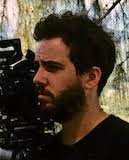 Artur Tort, Pacifiction – If a movie filmed in Tahiti, a literal earthly paradise, did not garner a nomination for cinematography, one might think it was filmed by an inept cinematographer. “Just point your camera and shoot, man!” Artur Tort is not inept, and he shoots the sunsets, idyllic beaches, and jungle-clad peaks in all of their glory, as we would expect. Sometimes, though, the setting is a dim lounge or a frenetic nightclub or a moonlit garden, and Tort captures them all faithfully. The nomination is worthy, alone, for a single extended sequence. Off the coast an armada of surfboards, jet skis, pleasure boats, and yachts undulate on a surging ocean while their occupants quaff cocktails and engage in party chatter and political intrigue as they grow sunburnt and chapped by the wind. It’s breathtaking. –jp Artur Tort, Pacifiction – If a movie filmed in Tahiti, a literal earthly paradise, did not garner a nomination for cinematography, one might think it was filmed by an inept cinematographer. “Just point your camera and shoot, man!” Artur Tort is not inept, and he shoots the sunsets, idyllic beaches, and jungle-clad peaks in all of their glory, as we would expect. Sometimes, though, the setting is a dim lounge or a frenetic nightclub or a moonlit garden, and Tort captures them all faithfully. The nomination is worthy, alone, for a single extended sequence. Off the coast an armada of surfboards, jet skis, pleasure boats, and yachts undulate on a surging ocean while their occupants quaff cocktails and engage in party chatter and political intrigue as they grow sunburnt and chapped by the wind. It’s breathtaking. –jp |
|
 Tudor Vladimir Panduru, R.M.N. – Tudor Vladimir Panduru, R.M.N. – |
|
 Barbara Alvarez, Utama – There was so much to work with in the Bolivian wilderness, from beautiful and desolate landscapes, the weathered faces of the indigenous couple around whom the film revolves, and the adorably comical ear-mittens worn by the herd of llama they take care of, and Barbara Alvarez weaves it all together to tell a beautiful story about life far from the city as the environment changes and seasonal weather patterns vital for survival are no longer reliable. Alvarez works with her director to bring to life a powerful story where so much is said in gestures, glances, gentle touches. Then she moves to the grand, capturing nature in its full glory to illustrate the important connection between a way of life that can only survive if it can remain in tune with the environment around it, and sadly, the city, where many of the villagers are fleeing to in resignation is probably a major contributing factor to this plight. But, oh, those llamas! –mrc Barbara Alvarez, Utama – There was so much to work with in the Bolivian wilderness, from beautiful and desolate landscapes, the weathered faces of the indigenous couple around whom the film revolves, and the adorably comical ear-mittens worn by the herd of llama they take care of, and Barbara Alvarez weaves it all together to tell a beautiful story about life far from the city as the environment changes and seasonal weather patterns vital for survival are no longer reliable. Alvarez works with her director to bring to life a powerful story where so much is said in gestures, glances, gentle touches. Then she moves to the grand, capturing nature in its full glory to illustrate the important connection between a way of life that can only survive if it can remain in tune with the environment around it, and sadly, the city, where many of the villagers are fleeing to in resignation is probably a major contributing factor to this plight. But, oh, those llamas! –mrc |
|
Best Production Design |
|
  Chris Oddy, The Zone of Interest – Chris Oddy, The Zone of Interest – |
|
 Ville Grönroos, Fallen Leaves – Ville Grönroos, Fallen Leaves – |
|
 Elisabeth Kozerski, We Might As Well Be Dead – Elisabeth Kozerski, We Might As Well Be Dead – |
|
|
|
|
 Mollie Wartelle, Linoleum – This film’s milieu somehow manages to appear both lovingly Mid-20th Century retro and unexpectedly futuristic, a plane of existence as familiar as a well-worn davenport and as bizarre as, well, a classic car dropped straight from the sky vertically into a suburban driveway. The attention to detail is Wes Anderson-level, but writer/director Colin West reveals a method to this madness steadily and rather poignantly over the course of the film. With Jim Gaffigan and Rhea Seehorn providing support enabling this unique science-fueled fantasy to resonate beyond its twisty premise, LINOLEUM ends up its own fully realized world. –ck Mollie Wartelle, Linoleum – This film’s milieu somehow manages to appear both lovingly Mid-20th Century retro and unexpectedly futuristic, a plane of existence as familiar as a well-worn davenport and as bizarre as, well, a classic car dropped straight from the sky vertically into a suburban driveway. The attention to detail is Wes Anderson-level, but writer/director Colin West reveals a method to this madness steadily and rather poignantly over the course of the film. With Jim Gaffigan and Rhea Seehorn providing support enabling this unique science-fueled fantasy to resonate beyond its twisty premise, LINOLEUM ends up its own fully realized world. –ck |
|
Best Documentary |
|
  20 Days in Mariupol – An important and relentless chronological compilation of footage and narration shot by a Ukrainian AP journalist. Chernov and his colleague Evgeniy Maloletka went to Mariupol during the first weeks of the Ukraine-Russia war, and stayed to document the brutal siege of this city. At first, on the streets, residents wonder if they should leave the city. Later in hospital hallways, the remaining medical staff converge on mutilated civilians, trying to save lives without supplies or electricity. Mariupol has gone from metropolis to ruin. 20 DAYS makes us see that just as important as documenting the siege developments are the reasons for doing it. A doctor angrily orders Chernov to keep filming so the world can see the devastation Russia is bringing on civilians. Ultimately, the small news team is led to safety and evacuation by Ukrainian soldiers who understand that the story must be told, that it must be made available to counter Russian disinformation. During those 20 days, Chernov was able to send out very little of his footage, because there was no Internet connection in the city. But he persisted, and this documentary includes the grainy stills that appeared on international news—a testament to his courage and dedication. –djy 20 Days in Mariupol – An important and relentless chronological compilation of footage and narration shot by a Ukrainian AP journalist. Chernov and his colleague Evgeniy Maloletka went to Mariupol during the first weeks of the Ukraine-Russia war, and stayed to document the brutal siege of this city. At first, on the streets, residents wonder if they should leave the city. Later in hospital hallways, the remaining medical staff converge on mutilated civilians, trying to save lives without supplies or electricity. Mariupol has gone from metropolis to ruin. 20 DAYS makes us see that just as important as documenting the siege developments are the reasons for doing it. A doctor angrily orders Chernov to keep filming so the world can see the devastation Russia is bringing on civilians. Ultimately, the small news team is led to safety and evacuation by Ukrainian soldiers who understand that the story must be told, that it must be made available to counter Russian disinformation. During those 20 days, Chernov was able to send out very little of his footage, because there was no Internet connection in the city. But he persisted, and this documentary includes the grainy stills that appeared on international news—a testament to his courage and dedication. –djy |
|
 After the Bite – Ivy Meeropol’s fourth feature documentary starts with a single premise, the aftermath of a surfer killed in a shark attack of the coat of Cape Cod, MA in 2018. The informational and absorbing film we get follows the investigations around the increasing number of shark sightings in the Cape Cod area, which correlates to the increasing population of seals in the area, which expands into the entire fascinating ecosystem of the Cape and how it has changed throughout history as tourism exploded. Add to that the insights provided about what it’s like to be a lifeguard… it’s not all sun and fit bodies… now their is a constant vigilance for shark sightings. Riveting and educational, After the Bite is everything a documentary should be. –mrc After the Bite – Ivy Meeropol’s fourth feature documentary starts with a single premise, the aftermath of a surfer killed in a shark attack of the coat of Cape Cod, MA in 2018. The informational and absorbing film we get follows the investigations around the increasing number of shark sightings in the Cape Cod area, which correlates to the increasing population of seals in the area, which expands into the entire fascinating ecosystem of the Cape and how it has changed throughout history as tourism exploded. Add to that the insights provided about what it’s like to be a lifeguard… it’s not all sun and fit bodies… now their is a constant vigilance for shark sightings. Riveting and educational, After the Bite is everything a documentary should be. –mrc |
|
 All That Breathes – All That Breathes – |
|
 All the Beauty and the Bloodshed – All the Beauty and the Bloodshed – |
|
 Still: A Michael J. Fox Movie – Still: A Michael J. Fox Movie – |
|
 Turn Every Page: the Adventures of Robert Caro and Robert Gottlieb – Book editor (and “New Yorker” editor) Robert Gottlieb’s daughter is the director. She interviews both her father and Lyndon Johnson biographer Robert Caro, whom her father has edited for 40-50 years. Both men are very funny, idiosyncratic, and passionate about their work. Now in their 80s, they will bend to the documentarian’s will. A delightful work, especially for fans of the writing process and history. –djy Turn Every Page: the Adventures of Robert Caro and Robert Gottlieb – Book editor (and “New Yorker” editor) Robert Gottlieb’s daughter is the director. She interviews both her father and Lyndon Johnson biographer Robert Caro, whom her father has edited for 40-50 years. Both men are very funny, idiosyncratic, and passionate about their work. Now in their 80s, they will bend to the documentarian’s will. A delightful work, especially for fans of the writing process and history. –djy |
|
Best Karaoke Performance |
|
  Fallen Leaves Fallen Leaves |
|
 Bank of Dave Bank of Dave |
|
 The Five Devils The Five Devils |
|
 Fremont Fremont |
|
 Rotting in the Sun Rotting in the Sun |
|
 Rye Lane Rye Lane |
|
Best Film Where There Might be Bears |
|
 R.M.N. R.M.N. |
|
| No Bears | |
Best Film Involving Cleaning Ladies |
|
  Full Time Full Time |
|
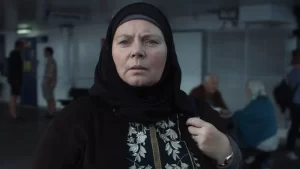 After Love After Love |
|
 Between Two Worlds Between Two Worlds |
|
 Rotting in the Sun Rotting in the Sun |
|

 Anna Rhodes, Rye Lane –
Anna Rhodes, Rye Lane –